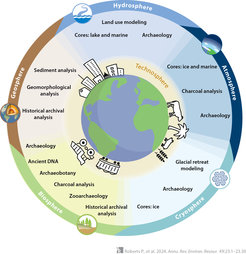Past Human Societies Left Widespread Environmental and Earth System Legacies
While debate about the start of the Anthropocene continues, its social, geophysical, and environmental roots undoubtedly lie deep in the past. Now, an interdisciplinary team of archaeologists, historians, palaeoecologists, and Earth system scientists highlights the ways in which human activities significantly altered parts of the Earth system prior to the Industrial Age, with ramifications for navigating current and future relationships with the planet.

Last year, formal geological designation of the Anthropocene epoch starting in 1950 was recommended by the Anthropocene Working Group of the International Commission on Stratigraphy. Ultimately the Commission rejected the recommendation, emphasizing the need to explore human–Earth system dynamics across a variety of spatial and temporal scales.
In a new review published in the Annual Review of Environment and Resources, an interdisciplinary team led by researchers from the Max Planck Institute of Geoanthropology highlights the ways in which human activities altered parts of the Earth system prior to the Industrial Age. They argue that archaeology, historical ecology, paleoecology and Indigenous knowledge can reveal past human-environment interactions and Earth system feedbacks, providing practical insights for contemporary societies.
Until recently, the impacts of past human-environment interactions were thought to be mostly local, but researchers argue that the use of different methodological approaches is key to better-understanding their scale and effects. For example, zooarchaeology and archaeobotany can be used to explore changing human interactions with biodiversity, while sediment core records can be used to explore the impacts of different land use practices on soil nutrients and erosion. New land use models can also be used to explore whether things like deforestation for agriculture lead to reductions in rainfall, impacting climatic feedbacks on local and regional scales.
While the new study’s research shows the long-term relationships of our species with different parts of the Earth system, the authors emphasize the disruption seen in local ecological interactions over the past 500 years.
“It is clear that European colonialism resulted in some of the more visible consequences across these different biomes,” says lead author Patrick Roberts of the isoTROPIC Research Group. “It left legacies of economic social inequalities and dramatic landscape and environmental transformation, which still shape the manifestation of the Anthropocene and its challenges in the 21st century.”
The researchers ultimately argue that understanding long-term relationships between humans and the Earth system will be essential to developing more equitable and sustainable relationships with the planet. By communicating findings from historical ecology and archaeology to policymakers, they hope to close the gap between local land use and global economic demands and to support more just political, economic, and environmental policy.












